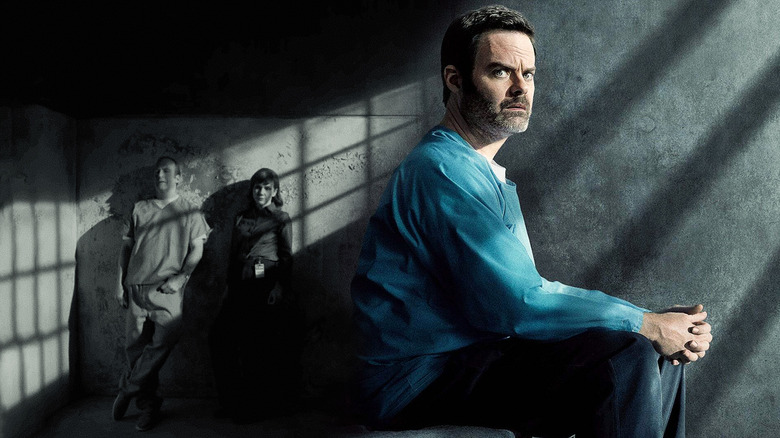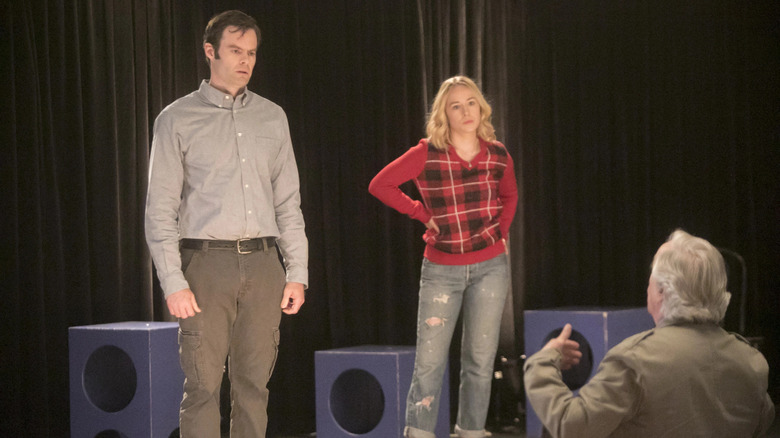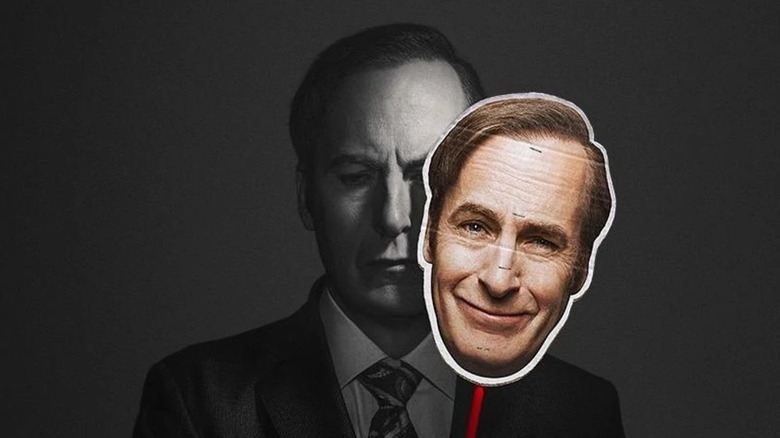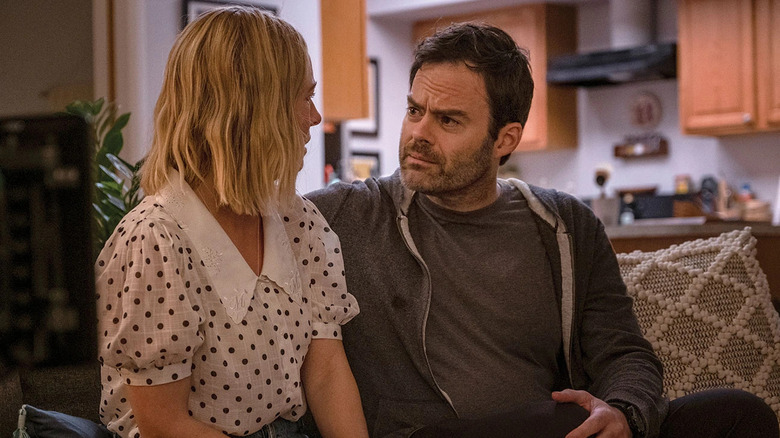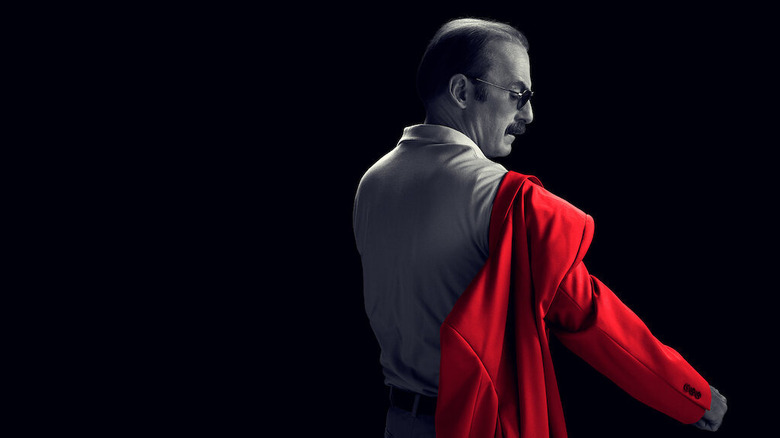Barry Learned Its Most Important Lesson From Better Call Saul
This article contains spoilers for "Barry."
While developing "Better Call Saul," Vince Gilligan and Peter Gould first envisioned the show as a half-hour "case of the week" legal comedy. Each episode would be about Saul Goodman (Bob Odenkirk) dealing with his latest client, before the client of his lifetime — Walter White (Bryan Cranston) — came along in "Breaking Bad." If you've seen "Better Call Saul," you know they didn't take long to ditch that idea. Instead, the show was an hour-long dramedy about former con man Jimmy McGill trying to make an honest living — even though he was destined to fail. Instead of a show laughing at Saul Goodman's antics, we learned that the persona is a personification of Jimmy's tragic inability to grow.
Gilligan, speaking to Rolling Stone about the show "Better Call Saul" became, said:
"'Breaking Bad' is about 25-percent humor, 75-percent drama, and maybe this will be the reverse of that.' Well this thing, especially in season 4, is every bit as dramatic as 'Breaking Bad' ever was. I just didn't see any of that coming."
"Better Call Saul" never ditched the comedy — take "50% Off," which opens with two petty crooks on a bender because Saul promised them a discounted defense. Even so, the creators resisted the temptation to be farcical and told a meaningful story instead. The result was a parable about morality, corruption, and redemption worthy of Dostoevsky. A series that has undergone a similar arc is "Barry," currently airing its fourth and final season on HBO.
The show 'Barry' could have been
"Barry" is high-concept: a hitman decides he wants to be an actor. In another world, this could easily be the premise for a sitcom or "Saturday Night Live" sketch (where series star and co-creator Bill Hader made his name). All you'd have to do is focus on the fish-out-of-water story — Barry was a U.S. Marine turned hitman, which are lifestyles where you can't draw attention or express yourself. Now, he wants a career where he has to do exactly that. From there, downplay the violence and play up Barry's well-meaning side. Even if you don't set him on the path to redemption, you can still make Barry endearing and make the crime side of the story more outlandish and easier to stomach.
In seasons 1-2, Barry is surrounded by quirky acting classmates, led by likable curmudgeon teacher Gene Cousineau (Henry Winkler). Even the characters in the crime storyline, such as the flamboyant Chechen gangster NoHo Hank (Anthony Carrigan), fit in with the comedy. "Barry" has the supporting cast a sitcom writer would dream of having.
Then there's the title — "Barry." That's not a scary name. The character's alliterative surname (Barry Berkman/stage name Barry Block) doubles the charm. The name-as-a-title even evokes sitcoms like "Seinfeld," "Will & Grace," "Maude," and more. But that's not the show Bill Hader and co-creator Alec Berg were interested in making.
Trapped by bad decision-making
The first scene of "Barry" is him leaving the site of his latest "job," a motel room with a dead man in the bed and a blood splatter on the wall behind him. From the beginning, we can't deny the reality of Barry's work and we can only root for him in spite of it.
I think the point of no return is the season 1 finale, "Starting Now." It prematurely resolves with a happy ending — Barry's left behind his life of crime, he's in a relationship with Sally (Sarah Goldberg), and he has even taken some baby steps toward an acting career. From here the show will be about his struggles as an actor, right? Wrong.
Cousineau's girlfriend, Detective Janice Moss (Paula Newsome) discovers the truth, so Barry kills her. Barry will never change and always make excuses for himself. He recites the episode's title to himself after killing Janice — from now on he'll be a good person, as if murder is like cheating on a diet.
Speaking about "Barry" to The Guardian, Hader said:
"From the start, I said, 'I want to explore the version of the disease that's in Barry, that's also maybe in everybody. That thing that makes us keep making bad choices, so let's explore that?' And people would say, 'OK, but, umm, it's a comedy, right?'"
However, Hader didn't think the comedy was an excuse not to delve into his characters' dark sides.
Self-imposed tragedy
Hader's intention is clearest by season 3 when consequences come for Barry. At the season's outset, the acting class setting is ditched and with it a lot of the supporting cast. Why? Since Gene discovered the truth about Janice's death and wants nothing to do with Barry. Their student-mentor relationship, which Barry treasured, has been destroyed forever.
Barry has always had anger issues — season 2 reveals he was discharged for killing an Afghan civilian— and he alienates Sally by verbally abusing her. Sally does end up coming back to Barry this season, but it's out of desperation, not love. Instead of "Barry" mining laughs from its lead character or putting him on the path to redemption, it's the story of how a destructive man has created a life he can't escape.
With this turn to darkness, some viewers have asked: Does "Barry" even count as a comedy anymore? I think it does. Season 3 has some killer satire about streaming services' poor judgment with their programming and season 4 has continued the show's astute visual humor. "Barry" just isn't a comedy where there's a light at the end of the tunnel.
Saul Barry-ed
Halfway through season 4, all the main characters of "Barry" are in a worse position than they were at the series' beginning. Fuches (Stephen Root) is in prison, Gene may or may not have accidentally shot his son (Andrew Leeds) to death, and Hank had to stand by as his lover Cristobal (Michael Irby) was executed. After a time skip, Barry and Sally ran away together and now live in the middle of nowhere: Barry never faced justice and Sally's acting dreams are dead. This life is a far cry from Barry's fantasies back in season 1 when he pictured himself and Sally as stars living it large in Beverly Hills.
"Better Call Saul" used an alternating timeline from the beginning — black-and-white flash-forwards showed the fate of Saul Goodman in a post "Breaking Bad" world. The last few episodes were set entirely in the flash-forward timeline, bringing Jimmy's story to a close.
How will "Barry" end? I'm not sure if Barry will own up to his sins like Jimmy, but I do think this time jump is designed as the ultimate proof of his inability to change. Even if you escape punishment for murder, you can't escape the consequences to your soul. In another world where "Barry" was a lighter comedy with a status quo, it would be exactly the type of show that thinks you can.
"Barry" airs on HBO and streams on HBO Max every Sunday at 10 p.m. ET.
